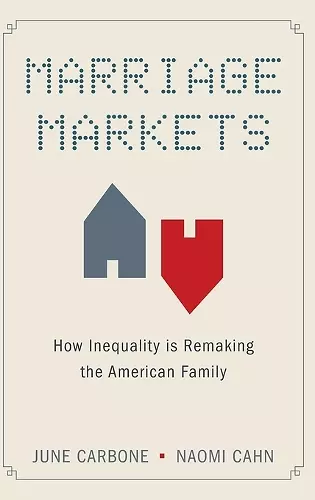Marriage Markets
How Inequality is Remaking the American Family
June Carbone author Naomi Cahn author
Format:Hardback
Publisher:Oxford University Press Inc
Published:29th May '14
Currently unavailable, and unfortunately no date known when it will be back

Over the past four decades, the American family has undergone a radical transformation. Skyrocketing rates of divorce, single parenthood, and couples with children out of wedlock have all worked to undermine an idealized family model that took root in the 1950s and has served as a beacon for traditionalists ever since. But what are the causes of this change? Conservatives blame it on moral decline and women's liberation. Progressives often attribute it to women's greater freedom and changing sexual mores, but they typically paint these trends in a positive light. In Family Classes, Naomi Cahn and June Carbone contend that these views miss the forest for the trees. Armed with authoritative evidence, they show that the changing structure of our economy is the root cause of the transformation, and that working class and poorer families have paid the highest price. Increasing inequality and instability in the labor market over the past three decades has had a disproportionately negative impact on family stability and marriage rates among working-class and lower-income Americans. In particular, the decline of stable blue collar jobs for men has upended the labor market in the lower deciles of the income chart. Conversely, educated middle class Americans now have the highest rates of both marriage and marital stability despite the fact that they are relatively unlikely to espouse 'traditional values.' In fact, their family stability rate appears to be increasing. That is important because the children of stable two-parent families really do have a leg up in life. They draw from truly fascinating sociological data to drive home their point that economic factors weigh heaviest. For instance, when eligible (i.e., desirable and marriageable) men outnumber eligible women, the marriage and marital stability rates are significantly higher than when the reverse situation occurs - the exact situation we have in America today. Among the educated middle classes, eligible men outnumber eligible women in the area that truly matters--high incomes--and people in that strata therefore have far more stable family lives than working class and poorer Americans. In these latter sectors, men have lost economic ground vis-à-vis women, and family lives have become increasingly unstable in the last two decades. Interestingly, religion and moral values are insignificant factors in generating this difference in comparison to...
In easy-to-read prose, the authors also show how divorce courts erect barriers between poor dads and their children, while expanding the rights of rich dads. Changing attitudes about marriage require overhauling family law to both strengthen unions while ending the presumption that marriage is best for rearing children. * David Cay Johnston, Books of the Year 2014, Newsweek *
Asking why fewer people marry, two American legal academics show how, over the decades, economic inequality has undermined the rationality of marriage for many and weakened the family. * Books of the year 2014, The Economist *
ISBN: 9780199916580
Dimensions: 165mm x 239mm x 23mm
Weight: 530g
272 pages